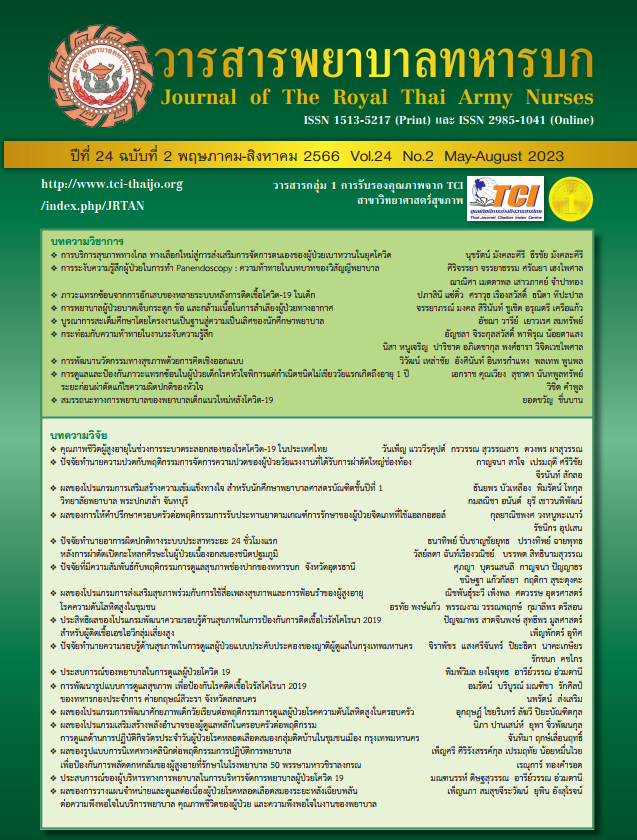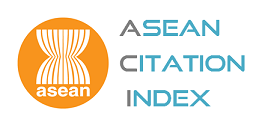การพัฒนาแนวปฏิบัติการพยาบาลสำหรับผู้ป่วยสมองบาดเจ็บ แผนกศัลยกรรม โรงพยาบาลนครพนม
คำสำคัญ:
การพัฒนาแนวปฏิบัติการพยาบาล, ผู้ป่วยสมองบาดเจ็บ, แผนกศัลยกรรมบทคัดย่อ
การศึกษานี้ มีวัตถุประสงค์เพื่อพัฒนาและศึกษาผลลัพธ์แนวปฏิบัติการพยาบาลผู้ป่วยสมองบาดเจ็บแผนกศัลยกรรม โรงพยาบาลนครพนม กลุ่มตัวอย่าง 117 คน เป็นผู้ป่วยสมองบาดเจ็บและญาติ 50 คน และพยาบาลวิชาชีพ 67 คน เครื่องมือ 2 ส่วน คือ 1) แนวปฏิบัติการพยาบาลพัฒนาจากแนวคิดของสภาวิจัยทางการแพทย์และสุขภาพแห่งชาติประเทศออสเตรเลีย 4 ระยะ ได้แก่ วิเคราะห์สถานการณ์ พัฒนาแนวปฏิบัติ เผยแพร่นำไปใช้ และประเมินผล 2) แบบรวบรวมข้อมูล 4 ส่วน คือ ความพึงพอใจ ของผู้ป่วยและญาติ ความเป็นไปได้ของแนวปฏิบัติ แบบทดสอบความรู้ และแบบสังเกตการปฏิบัติงานของพยาบาล IOC 0.92 ความเชื่อมั่น 0.88, 0.84, 0.81, 0.80 ตามลำดับ ทั้งฉบับ 0.84 ใช้สถิติแจกแจงความถี่ ร้อยละ ค่าเฉลี่ย ส่วนเบี่ยงเบนมาตรฐาน และ Wilcoxon Sign Rank Test
ผลการศึกษา 1) แนวปฏิบัติการพยาบาลผู้ป่วยสมองบาดเจ็บและแบบบันทึกการพยาบาล 3 องค์ประกอบ ได้แก่ การดูแลระยะวิกฤติ ฟื้นฟู และวางแผนจำหน่าย 2) ผลลัพธ์ไม่พบผู้ป่วยเสียชีวิต Glasgow coma score เฉลี่ยจำหน่ายสูงกว่าแรก รับอย่างมีนัยสำคัญทางสถิติ (p <.01) ความพึงพอใจของผู้ป่วยและญาติและความเป็นไปได้ของแนวปฏิบัติโดยรวมระดับมาก (M = 4.34, SD = 0.66) และ (M = 4.29, SD = 0.50) ตามลำดับ คะแนนความรู้หลังสูงกว่าก่อนใช้แนวปฏิบัติอย่างมีนัยสำคัญทาง สถิติ (p <.01)
ข้อเสนอแนะ แนวปฏิบัติการพยาบาลควรนำไปใช้ในการดูแลผู้ป่วยสมองบาดเจ็บแผนกศัลยกรรมและขยายผลในระยะ ยาว เพื่อให้ผู้ป่วยปลอดภัย ลดความทุพพลภาพและภาวะแทรกซ้อนจากการนอนนาน
Downloads
เอกสารอ้างอิง
Panjaisri S, Phuenpathom N, Veerasarn K. Clinical Practice Guidelines for Traumatic Brain Injury. Bangkok : Tana Press & Graphic company Limited; 2013. (in Thai)
Dewan MC, Rattani A, Gupta S, Baticulon RE, Hung YC, Punchak M, et al. Estimating the global incidence of traumatic brain injury. Journal of neurosurgery. 2018; 130(4): 1080 - 97.
Potaya S. The Glasgow Coma Scale. Journal of The Royal Thai Army Nurses. 2018; 19 (1) : 30 - 8. (in Thai)
Utaisang A, Pearkao C. Factors Associated with Severity Level of Post-Concussion Syndrome in Patients with Mild Traumatic Brain Injury. The National and International Graduate Research Conference. 2016: 668 - 77. (in Thai)
Nakhon Phanom Hospital. Top 5 Nakhon Phanom Hospital causes of deaths,2022; 2022. (in Thai)
Andelic N, Howe EI, Hellstrom T, Sanchez MF, Lu J, Lovstad M, et al. Disability and quality of life 20 years after traumatic brain injury. Brain and behavior. 2018; 8(7): 1-10.
Varghese R, Chakrabarty J, Menon G. Nursing Management of Adults with Severe Traumatic Brain Injury: A Narrative Review. Indian Journal of Critical Care Medicine. 2017; 21(10): 684 - 97.
Ganefianty A, Songwathana P, Nilmanat K. Transitional care programs to improve outcomes in patients with traumatic brain injury and their caregivers: A systematic review and meta-analysis. Belitung Nursing Journal. 2021; 7(6): 445 - 56
National Health and Medical Research Council. (NHMRC). A guide to the developmental, implementationand evaluation of clinical practice guidelines. National Health and Medical Research Council. Australia; 1999.
Smith LS. How to use Focus charting. Nursing. 2000; 30(5): 76 - 7.
Phunawakul S, Reungsri N, Montarak O, Kongros J. The Development of Clinical Nursing Practice Guideline for Patients with Surgery from Traumatic Brain Injury in Phichit Hospital. Journal of the Department of Medical Services. 2017; 42(6): 102 - 7. (in Thai)
Issaraphan K, Rojcheewin P. The Development of Clinical Nursing Practice Guideline for Patients with Surgery from Traumatic Brain Injury. Journal of Health Science. 2016; 5(5): 823 - 30. (in Thai)
Ongiem A, Vichitvejpaisal P. Validation of the Tests. Thai Journal of Anesthesiology. 2018; 44(1): 36-42 (in Thai)
Tayraukham S. Research methodology in social sciences and humanities. Kalasin: rasan Kanpim; 2008. (in Thai)
Koo TK, Li MY. A Guideline of Selecting and Reporting Intraclass Correlation Coefficients for Reliability Research. Journal of Chiropractic Medicine. 2016; 15(2): 155 – 63.
The Joanna Briggs Institute. Reviewers’ Manual 2014 Edition: Systematic Review; Protocol; Effectiveness; Qualitative; Economic; and Methods. Australia : Graphic Design and cover photography by Martin Williams; 2014.
Khiewchaum R, Wattana C. Holistic Nursing for Traumatic Brain Injury Patient. Journal of Phrapokklao Nursing College. 2017; 28(1): 129 - 39. (in Thai)
Kochaipath P, Intarit L. The Development of Nursing Care Model for Traumatic Brain Injury Patients in Community Hospital. Journal of phrapokklao nursing college. 2020; 30(2): 203 - 18. (in Thai)
Sopon A, Chumnanborirak P, Promtee P, Yutthakasemsunt S, Pochaisan O. The development model of severe traumatic brain injury: Case management study. Journal of Nursing Science Chulalongkorn University. 2017; 29(3):126 - 38. (in Thai)
Phuenpathom N, Srikitwilaikul. Editors. Clinical Practice Guidelines for Traumatic Brain Injury. Bangkok : Prosperous plus company Limited; 2020. (in Thai)
Kerdchuen K, Jittasusuttho Y, Panyapradit C. The Role of Nurses in Caring for Severe Head Injury Patients from Hospital to Home Care. Journal of Health and Nursing Education. 2021; 28(1): 1-13. (in Thai)
Varghese R, Chakrabarty J, Menon G. Nursing Management of Adults with Severe Traumatic Brain Injury: A Narrative Review. Indian Journal of Critical Care Medicine. 2017; 21(10): 684 - 97.
Marshall S, Bayley M, McCullagh S, Velikonja D, Berrigan L. Clinical practice guidelines for mild traumatic brain injury and persistent symptoms. Canadian Family Physician. 2012; 58(3): 257 - 67.
Prachuablarp C. Increased Intracranial Pressure in Patients with Brain Pathology: A Dimension of Evidence-Based Nursing Practice. Thai Journal of Nursing Council. 2018; 33(2): 15 - 28. (in Thai)
Yang L, Liao D, Hou X, Wang Y, Yang C. Systematic review and meta-analysis of the effect of nutritional support on the clinical outcome of patients with traumatic brain injury. Annals of Palliative Medicine. 2021; 10 (11): 11961- 69
Ganefianty A, Songwathana P, Nilmanat K. Transitional care programs to improve outcomes in patients with traumatic brain injury and their caregivers: A systematic review and meta-analysis. Belitung Nursing Journal. 2021; 7(6): 445 - 56.
Pattuwage L, Olver J, Martin C, Lai F, Piccenna L, Gruen R, et al. Management of spasticity in moderate and severe traumatic brain injury: evaluation of clinical practice guidelines. Journal of head trauma rehabilitation. 2017; 32(2): E1 - 12.
Plucktaweesak S, Thongtanunam Y, Yuadyong S. Development of care for patients with moderate to severe traumatic brain injury at Pranangklao Hospital. Journal of health science research. 2020; 14(3): 71-82. (in Thai)
Thaiudom A, Lumnok N. Development and Evaluation of Evidence-based Nursing Protocol for Patients with Moderate to Severe Traumatic Brain Injury. Journal of The Royal Thai Army Nurses. 2018; 19(3):107-16. (in Thai)
ดาวน์โหลด
เผยแพร่แล้ว
รูปแบบการอ้างอิง
ฉบับ
ประเภทบทความ
สัญญาอนุญาต
ลิขสิทธิ์ (c) 2023 วารสารพยาบาลทหารบก

อนุญาตภายใต้เงื่อนไข Creative Commons Attribution-NonCommercial-NoDerivatives 4.0 International License.
บทความหรือข้อคิดเห็นใดใดที่ปรากฏในวารสารพยาบาลทหารบกเป็นวรรณกรรมของผู้เขียน ซึ่งบรรณาธิการหรือสมาคมพยาบาลทหารบก ไม่จำเป็นต้องเห็นด้วย
บทความที่ได้รับการตีพิมพ์เป็นลิขสิทธิ์ของวารสารพยาบาลทหารบก
The ideas and opinions expressed in the Journal of The Royal Thai Army Nurses are those of the authors and not necessarily those
of the editor or Royal Thai Army Nurses Association.







